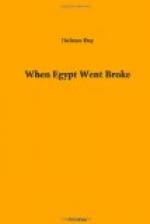Harnden had a new business; he was selling nursery stock. But that business did not account for his prosperity. He was taking town orders for his goods—taking orders on the town treasury, orders that had long been creased in wallets or had grown yellow in bureau drawers or had been dickered about at a few cents on the dollar and accepted when a debtor had nothing else with which to pay. Mr. Harnden said he was ready to take town orders at any time. He optimistically declared that his faith in the old town was firmly fixed. That optimism was entirely in accord with Mr. Harnden’s past professions; and nobody wondered much, because he was so foolish. But he was not wholly a fool in that matter. He had only about a fifty-per-cent faith in Egypt—he insisted on that much discount when he took in a town order. Even at that rate, Ossian Orne did insist that Harnden was a complete fool. Orne would not take town orders for his nursery stock. But Orne’s nose was out of joint, it was generally agreed. Harnden’s lithographs showed apples twice as big as Orne’s book did; the pears fairly oozed sweetness from their plump, pictured mellowness; there were peaches that provoked folks to make funny noises at the corners of their mouths when the optimistic Harnden flipped a page and brought the fruit to view. Nobody had ever heard of a peach tree growing among the rocks of Egypt. On the other hand, nobody supposed that a town order on the Egypt treasury was worth anything, as things stood. There were folks who bought peach trees!
And in the meantime there was much clatter in and about the old Britt house, tumble of timbers and rip of wainscotings and snarl of drawing nails. Out from the gaping windows floated the powdery drift of the plastering which the broad shovels had tackled. The satirists said that it was noticeable that the statue of Tasper Britt in the cemetery had settled down heavier on its heels, as if making grimly sure that Hittie was staying where she could not interfere.
In the meantime, also, Tasper Britt and a hired girl had become fixtures in the Harnden home—and the hired girl was quite in love with Vona and in entire sympathy with her stand; the girl brought to Vona’s room the tidbits of all the meals and offered to put tacks in Britt’s doughnuts if that would help matters any.
Vona was entirely serene in her companionship with her father and her mother. As for Tasper Britt, in sitting room or hall, on the street or on the lawn of the Harndens, he was ignored as completely, yet sweetly, as if he were an innocuous dweller in the so-called Fourth Dimension—to be seen through—even walked through—a mere shade, uninterred, unhonored, and unwarranted.
Tasper Britt, relentlessly on the job of punishing those who had poisoned his pride and his peace of mind, acknowledged to himself that the attitude of this girl was reacting on him in the way of more acute punishment than he was dealing out to anybody just then, except to Vaniman. Through the latter the girl was punished. But that punishment had steeled her to the stand she was making in the case of Britt. The god of the machine pondered on the case and constantly found himself in a more parlous state of mind because he did ponder.




